Werk
Alle Inhalte mit Metadaten des Vokabulars "Werk". Sie sehen nur Inhalte, für die Sie berechtigt sind.
1971 Inhalte
- Seite 1 von 165
Ministry for the Future, Episode 1 - Event
- Titel
- Ministry for the Future, Episode 1 - Event
- Autor/in
- Beschreibung (de)
- Ministry for the Future ist eine transdisziplinäre Produktion über mögliche Zukünfte im Angesicht der Klimakrise – und darüber, wie wir sie verhandeln, bevor sie eintreten. Inspiriert vom gleichnamigen Roman von Kim Stanley Robinson entwickelte sich ein groß angelegtes Kooperationsprojekt zwischen dem Theater Neumarkt, dem Collegium Helveticum Zürich und der Hochschule für Gestaltung Karlsruhe.
Ausgangspunkt ist ein spekulatives Szenario im Jahr 2034: Die Erde hat Kipppunkte erreicht, Regierungen reagieren, eine neue Institution wird gegründet – das Ministerium für die Zukunft. Innerhalb dieser Fiktion operiert die Produktion als diskursives Format, das sich fortlaufend mit der zentralen Frage auseinandersetzt: Welche Handlungsspielräume bleiben uns?
Das Projekt kombiniert künstlerische, wissenschaftliche und gestalterische Perspektiven zu einem Format zwischen Preenactment und realer Wissenschaftskommunikation. Herzstück ist ein mobiles Bühnenbild, das drängende forschungsbasierte Diskurse in eine begehbare, funktionale Infrastruktur übersetzt. Die Szenografie wurde konsequent durch Re- und Upcycling-Prozesse entwickelt. Sie folgt einer Haltung, die den Anforderungen ökologischer Krisen standhalten will – indem sie aus dem Material jener Krisen selbst hervorgeht. In vier thematisch fokussierten Episoden an vier verschiedenen Orten in Zürich wird der Raum selbst zum Instrument: eine spekulative Versammlung, eine temporäre Institution, ein Möglichkeitslabor.
Die Inszenierung bringt reale Wissenschaftler:innen, Performer:innen und Bürger:innen im Modus eines fiktionalen Ministeriums in Austausch – und mit ihnen die Fragen: Wie lässt sich Zukunft verhandeln, wenn sie längst begonnen hat? Was bedeutet Teilhabe, wenn die Katastrophe strukturell geworden ist? Und wie kann Raum für solche Aushandlungen heute aussehen?
- Ministry for the Future ist eine transdisziplinäre Produktion über mögliche Zukünfte im Angesicht der Klimakrise – und darüber, wie wir sie verhandeln, bevor sie eintreten. Inspiriert vom gleichnamigen Roman von Kim Stanley Robinson entwickelte sich ein groß angelegtes Kooperationsprojekt zwischen dem Theater Neumarkt, dem Collegium Helveticum Zürich und der Hochschule für Gestaltung Karlsruhe.
- Beschreibung (en)
- Ministry for the Future is a transdisciplinary production about possible futures in the face of the climate crisis—and about how we negotiate them before they arrive. Inspired by the novel of the same name by Kim Stanley Robinson, the project evolved into a large-scale collaboration between Theater Neumarkt, the Collegium Helveticum Zurich, and the Karlsruhe University of Arts and Design (HfG).
Its starting point is a speculative scenario set in the year 2034: the Earth has reached tipping points, governments are reacting, and a new institution is established—the Ministry for the Future. Within this fiction, the production functions as a discursive format that continuously engages with the central question: What room for action remains?
The project combines artistic, scientific, and design perspectives into a hybrid format somewhere between preenactment and real science communication. At its core is a mobile stage design that translates urgent, research-based discourses into an immersive, functional infrastructure. The scenography was developed entirely through re- and upcycling processes, guided by an attitude that seeks to meet the demands of ecological crises—by emerging from their very material. Across four thematically focused episodes in four different locations in Zurich, the space itself becomes an instrument: a speculative assembly, a temporary institution, a lab of possibilities.
The performance brings together real scientists, performers, and citizens within the framework of a fictional ministry—and with them, the questions: How can we negotiate the future when it has already begun? What does participation mean when catastrophe has become structural? And what kind of space is needed for such negotiations today?
- Ministry for the Future is a transdisciplinary production about possible futures in the face of the climate crisis—and about how we negotiate them before they arrive. Inspired by the novel of the same name by Kim Stanley Robinson, the project evolved into a large-scale collaboration between Theater Neumarkt, the Collegium Helveticum Zurich, and the Karlsruhe University of Arts and Design (HfG).
- Kategorie
- Typ des Projekts/Werks
- Schlagworte
- Datierung
- 14.02.2025 - 25.04.2025
- Mitwirkende
- Sprache
- Ort: Institution
- Stadt
- Land
- Beteiligte Institution(en)
- Internetlinks
- Titel
- Ministry for the Future, Episode 1 - Event
- Titel (en)
- Ministry for the Future, Episode 1 - event
- Urheberrechtshinweis
- © Collegium Helveticum Zürich
- Rechtsschutz/Lizenz
- Freigabe Nutzung HfG
- Medienersteller/in
- Beziehung/Funktion
- Medien-Beschreibung
- Ministry for the Future ist eine transdisziplinäre Produktion über mögliche Zukünfte im Angesicht der Klimakrise – und darüber, wie wir sie verhandeln, bevor sie eintreten. Inspiriert vom gleichnamigen Roman von Kim Stanley Robinson entwickelte sich ein groß angelegtes Kooperationsprojekt zwischen dem Theater Neumarkt, dem Collegium Helveticum Zürich und der Hochschule für Gestaltung Karlsruhe.
Ausgangspunkt ist ein spekulatives Szenario im Jahr 2034: Die Erde hat Kipppunkte erreicht, Regierungen reagieren, eine neue Institution wird gegründet – das Ministerium für die Zukunft. Innerhalb dieser Fiktion operiert die Produktion als diskursives Format, das sich fortlaufend mit der zentralen Frage auseinandersetzt: Welche Handlungsspielräume bleiben uns?
Das Projekt kombiniert künstlerische, wissenschaftliche und gestalterische Perspektiven zu einem Format zwischen Preenactment und realer Wissenschaftskommunikation. Herzstück ist ein mobiles Bühnenbild, das drängende forschungsbasierte Diskurse in eine begehbare, funktionale Infrastruktur übersetzt. Die Szenografie wurde konsequent durch Re- und Upcycling-Prozesse entwickelt. Sie folgt einer Haltung, die den Anforderungen ökologischer Krisen standhalten will – indem sie aus dem Material jener Krisen selbst hervorgeht. In vier thematisch fokussierten Episoden an vier verschiedenen Orten in Zürich wird der Raum selbst zum Instrument: eine spekulative Versammlung, eine temporäre Institution, ein Möglichkeitslabor.
Die Inszenierung bringt reale Wissenschaftler:innen, Performer:innen und Bürger:innen im Modus eines fiktionalen Ministeriums in Austausch – und mit ihnen die Fragen: Wie lässt sich Zukunft verhandeln, wenn sie längst begonnen hat? Was bedeutet Teilhabe, wenn die Katastrophe strukturell geworden ist? Und wie kann Raum für solche Aushandlungen heute aussehen?
Wissenschaftskommunikation
Wissenschaftliches Denken wird nicht nur vermittelt, sondern verhandelt. In dieser Inszenierung treffen sich reale Wissenschaftler:innen aus Klima-, Sozial- und Zukunftsforschung und der Bürger:innenrat -das Publikum- auf Augenhöhe. Gemeinsam werden sie zu Akteur:innen eines kollektiven Nachdenkens. Die Bühne fungiert als Kommunikationsraum, in dem sich Fakten, Unsicherheiten und ethische Fragen gleichberechtigt begegnen – ein Diskurs in Echtzeit.
Teilhabe und Verantwortung
Das Publikum ist eingeladen, Teil einer spekulativen Institution zu werden: des Ministeriums für die Zukunft. Durch offene Sitzordnungen, modulare Raumformate und diskursive Interventionen wird die klassische Zuschauer:innenrolle aufgelöst. Alle sind Akteur:innen in der kollektiven Auseinandersetzung. Ministry for the Future denkt Teilhabe als strukturelles Prinzip – auch in der Gestaltung der Orte selbst.
- Ministry for the Future ist eine transdisziplinäre Produktion über mögliche Zukünfte im Angesicht der Klimakrise – und darüber, wie wir sie verhandeln, bevor sie eintreten. Inspiriert vom gleichnamigen Roman von Kim Stanley Robinson entwickelte sich ein groß angelegtes Kooperationsprojekt zwischen dem Theater Neumarkt, dem Collegium Helveticum Zürich und der Hochschule für Gestaltung Karlsruhe.
- Medien-Beschreibung (en)
- Science Communication
Scientific thinking is not only conveyed, but negotiated. In this performance, real scientists from the fields of climate, social, and futures research meet with the citizens’ assembly—the audience—on equal footing. Together they become actors in a collective process of reflection. The stage functions as a space of communication where facts, uncertainties, and ethical questions interact on equal terms—a discourse in real time.
Participation and Responsibility
The audience is invited to become part of a speculative institution: the Ministry for the Future. Through open seating arrangements, modular spatial formats, and discursive interventions, the classical role of the spectator is dissolved. Everyone becomes an actor in the collective engagement. Ministry for the Future treats participation as a structural principle—even in the shaping of the spaces themselves.
- Science Communication
- Projektleiter/in
- Semester
- Studiengang
- Importiert am
- 29.06.2025
- Übergeordnete Sets
- 1
Ministry for the Future, Episode 1 - Intervention
- Titel
- Ministry for the Future, Episode 1 - Intervention
- Autor/in
- Beschreibung (de)
- Ministry for the Future ist eine transdisziplinäre Produktion über mögliche Zukünfte im Angesicht der Klimakrise – und darüber, wie wir sie verhandeln, bevor sie eintreten. Inspiriert vom gleichnamigen Roman von Kim Stanley Robinson entwickelte sich ein groß angelegtes Kooperationsprojekt zwischen dem Theater Neumarkt, dem Collegium Helveticum Zürich und der Hochschule für Gestaltung Karlsruhe.
Ausgangspunkt ist ein spekulatives Szenario im Jahr 2034: Die Erde hat Kipppunkte erreicht, Regierungen reagieren, eine neue Institution wird gegründet – das Ministerium für die Zukunft. Innerhalb dieser Fiktion operiert die Produktion als diskursives Format, das sich fortlaufend mit der zentralen Frage auseinandersetzt: Welche Handlungsspielräume bleiben uns?
Das Projekt kombiniert künstlerische, wissenschaftliche und gestalterische Perspektiven zu einem Format zwischen Preenactment und realer Wissenschaftskommunikation. Herzstück ist ein mobiles Bühnenbild, das drängende forschungsbasierte Diskurse in eine begehbare, funktionale Infrastruktur übersetzt. Die Szenografie wurde konsequent durch Re- und Upcycling-Prozesse entwickelt. Sie folgt einer Haltung, die den Anforderungen ökologischer Krisen standhalten will – indem sie aus dem Material jener Krisen selbst hervorgeht. In vier thematisch fokussierten Episoden an vier verschiedenen Orten in Zürich wird der Raum selbst zum Instrument: eine spekulative Versammlung, eine temporäre Institution, ein Möglichkeitslabor.
Die Inszenierung bringt reale Wissenschaftler:innen, Performer:innen und Bürger:innen im Modus eines fiktionalen Ministeriums in Austausch – und mit ihnen die Fragen: Wie lässt sich Zukunft verhandeln, wenn sie längst begonnen hat? Was bedeutet Teilhabe, wenn die Katastrophe strukturell geworden ist? Und wie kann Raum für solche Aushandlungen heute aussehen?
- Ministry for the Future ist eine transdisziplinäre Produktion über mögliche Zukünfte im Angesicht der Klimakrise – und darüber, wie wir sie verhandeln, bevor sie eintreten. Inspiriert vom gleichnamigen Roman von Kim Stanley Robinson entwickelte sich ein groß angelegtes Kooperationsprojekt zwischen dem Theater Neumarkt, dem Collegium Helveticum Zürich und der Hochschule für Gestaltung Karlsruhe.
- Beschreibung (en)
-
Ministry for the Future is a transdisciplinary production about possible futures in the face of the climate crisis—and about how we negotiate them before they arrive. Inspired by the novel of the same name by Kim Stanley Robinson, the project evolved into a large-scale collaboration between Theater Neumarkt, the Collegium Helveticum Zurich, and the Karlsruhe University of Arts and Design (HfG).
Its starting point is a speculative scenario set in the year 2034: the Earth has reached tipping points, governments are reacting, and a new institution is established—the Ministry for the Future. Within this fiction, the production functions as a discursive format that continuously engages with the central question: What room for action remains?
The project combines artistic, scientific, and design perspectives into a hybrid format somewhere between preenactment and real science communication. At its core is a mobile stage design that translates urgent, research-based discourses into an immersive, functional infrastructure. The scenography was developed entirely through re- and upcycling processes, guided by an attitude that seeks to meet the demands of ecological crises—by emerging from their very material. Across four thematically focused episodes in four different locations in Zurich, the space itself becomes an instrument: a speculative assembly, a temporary institution, a lab of possibilities.
The performance brings together real scientists, performers, and citizens within the framework of a fictional ministry—and with them, the questions: How can we negotiate the future when it has already begun? What does participation mean when catastrophe has become structural? And what kind of space is needed for such negotiations today?
-
- Kategorie
- Typ des Projekts/Werks
- Schlagworte
- Datierung
- 14.02.2025 - 25.04.2025
- Mitwirkende
- Sprache
- Ort: Institution
- Beteiligte Institution(en)
- Internetlinks
- Titel
- Ministry for the Future, Episode 1 - Intervention
- Titel (en)
- Ministry for the Future, Episode 1 - intervention
- Urheberrechtshinweis
- © Birke Beyer
- Rechtsschutz/Lizenz
- Freigabe Nutzung HfG
- Medienersteller/in
- Beziehung/Funktion
- Abgebildete Personen
- Projektleiter/in
- Semester
- Studiengang
- Importiert am
- 29.06.2025
- Übergeordnete Sets
- 1
Ministry for the Future, Episode 1 - Event
- Titel
- Ministry for the Future, Episode 1 - Event
- Autor/in
- Beschreibung (de)
- Ministry for the Future ist eine transdisziplinäre Produktion über mögliche Zukünfte im Angesicht der Klimakrise – und darüber, wie wir sie verhandeln, bevor sie eintreten. Inspiriert vom gleichnamigen Roman von Kim Stanley Robinson entwickelte sich ein groß angelegtes Kooperationsprojekt zwischen dem Theater Neumarkt, dem Collegium Helveticum Zürich und der Hochschule für Gestaltung Karlsruhe.
Ausgangspunkt ist ein spekulatives Szenario im Jahr 2034: Die Erde hat Kipppunkte erreicht, Regierungen reagieren, eine neue Institution wird gegründet – das Ministerium für die Zukunft. Innerhalb dieser Fiktion operiert die Produktion als diskursives Format, das sich fortlaufend mit der zentralen Frage auseinandersetzt: Welche Handlungsspielräume bleiben uns?
Das Projekt kombiniert künstlerische, wissenschaftliche und gestalterische Perspektiven zu einem Format zwischen Preenactment und realer Wissenschaftskommunikation. Herzstück ist ein mobiles Bühnenbild, das drängende forschungsbasierte Diskurse in eine begehbare, funktionale Infrastruktur übersetzt. Die Szenografie wurde konsequent durch Re- und Upcycling-Prozesse entwickelt. Sie folgt einer Haltung, die den Anforderungen ökologischer Krisen standhalten will – indem sie aus dem Material jener Krisen selbst hervorgeht. In vier thematisch fokussierten Episoden an vier verschiedenen Orten in Zürich wird der Raum selbst zum Instrument: eine spekulative Versammlung, eine temporäre Institution, ein Möglichkeitslabor.
Die Inszenierung bringt reale Wissenschaftler:innen, Performer:innen und Bürger:innen im Modus eines fiktionalen Ministeriums in Austausch – und mit ihnen die Fragen: Wie lässt sich Zukunft verhandeln, wenn sie längst begonnen hat? Was bedeutet Teilhabe, wenn die Katastrophe strukturell geworden ist? Und wie kann Raum für solche Aushandlungen heute aussehen?
- Ministry for the Future ist eine transdisziplinäre Produktion über mögliche Zukünfte im Angesicht der Klimakrise – und darüber, wie wir sie verhandeln, bevor sie eintreten. Inspiriert vom gleichnamigen Roman von Kim Stanley Robinson entwickelte sich ein groß angelegtes Kooperationsprojekt zwischen dem Theater Neumarkt, dem Collegium Helveticum Zürich und der Hochschule für Gestaltung Karlsruhe.
- Beschreibung (en)
- Ministry for the Future is a transdisciplinary production about possible futures in the face of the climate crisis—and about how we negotiate them before they arrive. Inspired by the novel of the same name by Kim Stanley Robinson, the project evolved into a large-scale collaboration between Theater Neumarkt, the Collegium Helveticum Zurich, and the Karlsruhe University of Arts and Design (HfG).
Its starting point is a speculative scenario set in the year 2034: the Earth has reached tipping points, governments are reacting, and a new institution is established—the Ministry for the Future. Within this fiction, the production functions as a discursive format that continuously engages with the central question: What room for action remains?
The project combines artistic, scientific, and design perspectives into a hybrid format somewhere between preenactment and real science communication. At its core is a mobile stage design that translates urgent, research-based discourses into an immersive, functional infrastructure. The scenography was developed entirely through re- and upcycling processes, guided by an attitude that seeks to meet the demands of ecological crises—by emerging from their very material. Across four thematically focused episodes in four different locations in Zurich, the space itself becomes an instrument: a speculative assembly, a temporary institution, a lab of possibilities.
The performance brings together real scientists, performers, and citizens within the framework of a fictional ministry—and with them, the questions: How can we negotiate the future when it has already begun? What does participation mean when catastrophe has become structural? And what kind of space is needed for such negotiations today?
- Ministry for the Future is a transdisciplinary production about possible futures in the face of the climate crisis—and about how we negotiate them before they arrive. Inspired by the novel of the same name by Kim Stanley Robinson, the project evolved into a large-scale collaboration between Theater Neumarkt, the Collegium Helveticum Zurich, and the Karlsruhe University of Arts and Design (HfG).
- Kategorie
- Typ des Projekts/Werks
- Schlagworte
- Datierung
- 14.02.2025 - 25.04.2025
- Mitwirkende
- Sprache
- Ort: Institution
- Stadt
- Land
- Beteiligte Institution(en)
- Internetlinks
- Titel
- Ministry for the Future, Episode 1 - Event
- Titel (en)
- Ministry for the Future, Episode 1 - event
- Urheberrechtshinweis
- © Collegium Helveticum
- Rechtsschutz/Lizenz
- Freigabe Nutzung HfG
- Medienersteller/in
- Beziehung/Funktion
- Medien-Beschreibung
- Wissenschaftskommunikation
Wissenschaftliches Denken wird nicht nur vermittelt, sondern verhandelt. In dieser Inszenierung treffen sich reale Wissenschaftler:innen aus Klima-, Sozial- und Zukunftsforschung und der Bürger:innenrat -das Publikum- auf Augenhöhe. Gemeinsam werden sie zu Akteur:innen eines kollektiven Nachdenkens. Die Bühne fungiert als Kommunikationsraum, in dem sich Fakten, Unsicherheiten und ethische Fragen gleichberechtigt begegnen – ein Diskurs in Echtzeit.
Teilhabe und Verantwortung
Das Publikum ist eingeladen, Teil einer spekulativen Institution zu werden: des Ministeriums für die Zukunft. Durch offene Sitzordnungen, modulare Raumformate und diskursive Interventionen wird die klassische Zuschauer:innenrolle aufgelöst. Alle sind Akteur:innen in der kollektiven Auseinandersetzung. Ministry for the Future denkt Teilhabe als strukturelles Prinzip – auch in der Gestaltung der Orte selbst.
- Wissenschaftskommunikation
- Medien-Beschreibung (en)
- Science Communication
Scientific thinking is not only conveyed, but negotiated. In this performance, real scientists from the fields of climate, social, and futures research meet with the citizens’ assembly—the audience—on equal footing. Together they become actors in a collective process of reflection. The stage functions as a space of communication where facts, uncertainties, and ethical questions interact on equal terms—a discourse in real time.
Participation and Responsibility
The audience is invited to become part of a speculative institution: the Ministry for the Future. Through open seating arrangements, modular spatial formats, and discursive interventions, the classical role of the spectator is dissolved. Everyone becomes an actor in the collective engagement. Ministry for the Future treats participation as a structural principle—even in the shaping of the spaces themselves.
- Science Communication
- Abgebildete Personen
- Projektleiter/in
- Semester
- Studiengang
- Importiert am
- 29.06.2025
- Übergeordnete Sets
- 1
Ministry for the Future, Episode 1 - Detail
- Titel
- Ministry for the Future, Episode 1 - Detail
- Autor/in
- Beschreibung (de)
- Ministry for the Future ist eine transdisziplinäre Produktion über mögliche Zukünfte im Angesicht der Klimakrise – und darüber, wie wir sie verhandeln, bevor sie eintreten. Inspiriert vom gleichnamigen Roman von Kim Stanley Robinson entwickelte sich ein groß angelegtes Kooperationsprojekt zwischen dem Theater Neumarkt, dem Collegium Helveticum Zürich und der Hochschule für Gestaltung Karlsruhe.
Ausgangspunkt ist ein spekulatives Szenario im Jahr 2034: Die Erde hat Kipppunkte erreicht, Regierungen reagieren, eine neue Institution wird gegründet – das Ministerium für die Zukunft. Innerhalb dieser Fiktion operiert die Produktion als diskursives Format, das sich fortlaufend mit der zentralen Frage auseinandersetzt: Welche Handlungsspielräume bleiben uns?
Das Projekt kombiniert künstlerische, wissenschaftliche und gestalterische Perspektiven zu einem Format zwischen Preenactment und realer Wissenschaftskommunikation. Herzstück ist ein mobiles Bühnenbild, das drängende forschungsbasierte Diskurse in eine begehbare, funktionale Infrastruktur übersetzt. Die Szenografie wurde konsequent durch Re- und Upcycling-Prozesse entwickelt. Sie folgt einer Haltung, die den Anforderungen ökologischer Krisen standhalten will – indem sie aus dem Material jener Krisen selbst hervorgeht. In vier thematisch fokussierten Episoden an vier verschiedenen Orten in Zürich wird der Raum selbst zum Instrument: eine spekulative Versammlung, eine temporäre Institution, ein Möglichkeitslabor.
Die Inszenierung bringt reale Wissenschaftler:innen, Performer:innen und Bürger:innen im Modus eines fiktionalen Ministeriums in Austausch – und mit ihnen die Fragen: Wie lässt sich Zukunft verhandeln, wenn sie längst begonnen hat? Was bedeutet Teilhabe, wenn die Katastrophe strukturell geworden ist? Und wie kann Raum für solche Aushandlungen heute aussehen?
- Ministry for the Future ist eine transdisziplinäre Produktion über mögliche Zukünfte im Angesicht der Klimakrise – und darüber, wie wir sie verhandeln, bevor sie eintreten. Inspiriert vom gleichnamigen Roman von Kim Stanley Robinson entwickelte sich ein groß angelegtes Kooperationsprojekt zwischen dem Theater Neumarkt, dem Collegium Helveticum Zürich und der Hochschule für Gestaltung Karlsruhe.
- Beschreibung (en)
- Ministry for the Future is a transdisciplinary production about possible futures in the face of the climate crisis—and about how we negotiate them before they arrive. Inspired by the novel of the same name by Kim Stanley Robinson, the project evolved into a large-scale collaboration between Theater Neumarkt, the Collegium Helveticum Zurich, and the Karlsruhe University of Arts and Design (HfG).
Its starting point is a speculative scenario set in the year 2034: the Earth has reached tipping points, governments are reacting, and a new institution is established—the Ministry for the Future. Within this fiction, the production functions as a discursive format that continuously engages with the central question: What room for action remains?
The project combines artistic, scientific, and design perspectives into a hybrid format somewhere between preenactment and real science communication. At its core is a mobile stage design that translates urgent, research-based discourses into an immersive, functional infrastructure. The scenography was developed entirely through re- and upcycling processes, guided by an attitude that seeks to meet the demands of ecological crises—by emerging from their very material. Across four thematically focused episodes in four different locations in Zurich, the space itself becomes an instrument: a speculative assembly, a temporary institution, a lab of possibilities.
The performance brings together real scientists, performers, and citizens within the framework of a fictional ministry—and with them, the questions: How can we negotiate the future when it has already begun? What does participation mean when catastrophe has become structural? And what kind of space is needed for such negotiations today?
- Ministry for the Future is a transdisciplinary production about possible futures in the face of the climate crisis—and about how we negotiate them before they arrive. Inspired by the novel of the same name by Kim Stanley Robinson, the project evolved into a large-scale collaboration between Theater Neumarkt, the Collegium Helveticum Zurich, and the Karlsruhe University of Arts and Design (HfG).
- Kategorie
- Typ des Projekts/Werks
- Schlagworte
- Datierung
- 14.02.2025 - 25.04.2025
- Mitwirkende
- Sprache
- Ort: Institution
- Stadt
- Land
- Beteiligte Institution(en)
- Internetlinks
- Titel
- Ministry for the Future, Episode 1 - Detail
- Titel (en)
- Ministry for the Future, Episode 1 - detail
- Urheberrechtshinweis
- © Birke Beyer
- Rechtsschutz/Lizenz
- Freigabe Nutzung HfG
- Medienersteller/in
- Medien-Beschreibung
- Krisenästhetik
Ministry for the Future denkt Zukunft als materielle Praxis im Krisenmodus der planetaren Erschöpfung. Die Szenografie wird dabei selbst zum Statement: Modular, mobil, weitgehend aus wiederverwendeten Materialien gefertigt, nimmt sie die Krise nicht nur als Thema, sondern als Produktionsbedingung ernst. Statt dystopischer Illustration oder unbegrenzter Technikvision wird ein ästhetischer Umgang mit Funktion, Knappheit und Transformation vorgeschlagen – resilient, improvisiert, offen
- Krisenästhetik
- Medien-Beschreibung (en)
- Aesthetics of Crisis
Ministry for the Future imagines the future as a material practice within the crisis mode of planetary exhaustion. The scenography becomes a statement in itself: modular, mobile, largely made from reused materials—it takes the crisis not only as its theme but as a condition of production. Instead of dystopian illustration or limitless technological visions, it proposes an aesthetic approach to function, scarcity, and transformation—resilient, improvised, open.
- Aesthetics of Crisis
- Projektleiter/in
- Semester
- Studiengang
- Importiert am
- 29.06.2025
- Übergeordnete Sets
- 1
Ministry for the Future, Episode 2 - Intervention
- Titel
- Ministry for the Future, Episode 2 - Intervention
- Autor/in
- Beschreibung (de)
- Ministry for the Future ist eine transdisziplinäre Produktion über mögliche Zukünfte im Angesicht der Klimakrise – und darüber, wie wir sie verhandeln, bevor sie eintreten. Inspiriert vom gleichnamigen Roman von Kim Stanley Robinson entwickelte sich ein groß angelegtes Kooperationsprojekt zwischen dem Theater Neumarkt, dem Collegium Helveticum Zürich und der Hochschule für Gestaltung Karlsruhe.
Ausgangspunkt ist ein spekulatives Szenario im Jahr 2034: Die Erde hat Kipppunkte erreicht, Regierungen reagieren, eine neue Institution wird gegründet – das Ministerium für die Zukunft. Innerhalb dieser Fiktion operiert die Produktion als diskursives Format, das sich fortlaufend mit der zentralen Frage auseinandersetzt: Welche Handlungsspielräume bleiben uns?
Das Projekt kombiniert künstlerische, wissenschaftliche und gestalterische Perspektiven zu einem Format zwischen Preenactment und realer Wissenschaftskommunikation. Herzstück ist ein mobiles Bühnenbild, das drängende forschungsbasierte Diskurse in eine begehbare, funktionale Infrastruktur übersetzt. Die Szenografie wurde konsequent durch Re- und Upcycling-Prozesse entwickelt. Sie folgt einer Haltung, die den Anforderungen ökologischer Krisen standhalten will – indem sie aus dem Material jener Krisen selbst hervorgeht. In vier thematisch fokussierten Episoden an vier verschiedenen Orten in Zürich wird der Raum selbst zum Instrument: eine spekulative Versammlung, eine temporäre Institution, ein Möglichkeitslabor.
Die Inszenierung bringt reale Wissenschaftler:innen, Performer:innen und Bürger:innen im Modus eines fiktionalen Ministeriums in Austausch – und mit ihnen die Fragen: Wie lässt sich Zukunft verhandeln, wenn sie längst begonnen hat? Was bedeutet Teilhabe, wenn die Katastrophe strukturell geworden ist? Und wie kann Raum für solche Aushandlungen heute aussehen?
- Ministry for the Future ist eine transdisziplinäre Produktion über mögliche Zukünfte im Angesicht der Klimakrise – und darüber, wie wir sie verhandeln, bevor sie eintreten. Inspiriert vom gleichnamigen Roman von Kim Stanley Robinson entwickelte sich ein groß angelegtes Kooperationsprojekt zwischen dem Theater Neumarkt, dem Collegium Helveticum Zürich und der Hochschule für Gestaltung Karlsruhe.
- Beschreibung (en)
-
Ministry for the Future is a transdisciplinary production about possible futures in the face of the climate crisis—and about how we negotiate them before they arrive. Inspired by the novel of the same name by Kim Stanley Robinson, the project evolved into a large-scale collaboration between Theater Neumarkt, the Collegium Helveticum Zurich, and the Karlsruhe University of Arts and Design (HfG).
Its starting point is a speculative scenario set in the year 2034: the Earth has reached tipping points, governments are reacting, and a new institution is established—the Ministry for the Future. Within this fiction, the production functions as a discursive format that continuously engages with the central question: What room for action remains?
The project combines artistic, scientific, and design perspectives into a hybrid format somewhere between preenactment and real science communication. At its core is a mobile stage design that translates urgent, research-based discourses into an immersive, functional infrastructure. The scenography was developed entirely through re- and upcycling processes, guided by an attitude that seeks to meet the demands of ecological crises—by emerging from their very material. Across four thematically focused episodes in four different locations in Zurich, the space itself becomes an instrument: a speculative assembly, a temporary institution, a lab of possibilities.
The performance brings together real scientists, performers, and citizens within the framework of a fictional ministry—and with them, the questions: How can we negotiate the future when it has already begun? What does participation mean when catastrophe has become structural? And what kind of space is needed for such negotiations today?
-
- Kategorie
- Typ des Projekts/Werks
- Schlagworte
- Datierung
- 14.02.2025 - 25.04.2025
- Mitwirkende
- Sprache
- Ort: Institution
- Beteiligte Institution(en)
- Internetlinks
- Titel
- Ministry for the Future, Episode 2 - Intervention
- Titel (en)
- Ministry for the Future, Episode 2 - intervention
- Urheberrechtshinweis
- © Collegium Helveticum
- Rechtsschutz/Lizenz
- Freigabe Nutzung HfG
- Medienersteller/in
- Beziehung/Funktion
- Medien-Beschreibung
- Situative Platznahme
Ministry for the Future versteht Intervention als situative Platznahme in öffentlichen, wissenschaftlichen und ästhetischen Räumen. In Form des fiktiven Ministeriums werden temporäre Infrastrukturen geschaffen, die unterstützen oder auch Reibung erzeugen.
An vier Orten in Zürich reagiert das mobile Set auf konkrete räumliche, institutionelle und thematische Kontexte: als installative Präsenz, als Gesprächsarchitektur, als spekulative Behörde oder als gezielte Störung. Intendiert ist damit weniger ein Bruch als ein Angebot – im Einschreiben einer möglichen Zukunft in die Logik des Hier und Jetzt.
- Situative Platznahme
- Medien-Beschreibung (en)
- Situational Occupation of Space
Ministry for the Future understands intervention as situational occupation—within public, scientific, and aesthetic spaces. In the form of the fictional ministry, temporary infrastructures are created that either support or disrupt. In four locations in Zurich, the mobile set responds to concrete spatial, institutional, and thematic contexts: as an installative presence, as conversation architecture, as speculative authority, or as deliberate provocation. The aim is not rupture, but offering—a way of inscribing a possible future into the logic of the present.
- Situational Occupation of Space
- Projektleiter/in
- Semester
- Studiengang
- Importiert am
- 29.06.2025
- Übergeordnete Sets
- 1
Ministry for the Future, Episode 1 - Event
- Titel
- Ministry for the Future, Episode 1 - Event
- Autor/in
- Beschreibung (de)
- Ministry for the Future ist eine transdisziplinäre Produktion über mögliche Zukünfte im Angesicht der Klimakrise – und darüber, wie wir sie verhandeln, bevor sie eintreten. Inspiriert vom gleichnamigen Roman von Kim Stanley Robinson entwickelte sich ein groß angelegtes Kooperationsprojekt zwischen dem Theater Neumarkt, dem Collegium Helveticum Zürich und der Hochschule für Gestaltung Karlsruhe.
Ausgangspunkt ist ein spekulatives Szenario im Jahr 2034: Die Erde hat Kipppunkte erreicht, Regierungen reagieren, eine neue Institution wird gegründet – das Ministerium für die Zukunft. Innerhalb dieser Fiktion operiert die Produktion als diskursives Format, das sich fortlaufend mit der zentralen Frage auseinandersetzt: Welche Handlungsspielräume bleiben uns?
Das Projekt kombiniert künstlerische, wissenschaftliche und gestalterische Perspektiven zu einem Format zwischen Preenactment und realer Wissenschaftskommunikation. Herzstück ist ein mobiles Bühnenbild, das drängende forschungsbasierte Diskurse in eine begehbare, funktionale Infrastruktur übersetzt. Die Szenografie wurde konsequent durch Re- und Upcycling-Prozesse entwickelt. Sie folgt einer Haltung, die den Anforderungen ökologischer Krisen standhalten will – indem sie aus dem Material jener Krisen selbst hervorgeht. In vier thematisch fokussierten Episoden an vier verschiedenen Orten in Zürich wird der Raum selbst zum Instrument: eine spekulative Versammlung, eine temporäre Institution, ein Möglichkeitslabor.
Die Inszenierung bringt reale Wissenschaftler:innen, Performer:innen und Bürger:innen im Modus eines fiktionalen Ministeriums in Austausch – und mit ihnen die Fragen: Wie lässt sich Zukunft verhandeln, wenn sie längst begonnen hat? Was bedeutet Teilhabe, wenn die Katastrophe strukturell geworden ist? Und wie kann Raum für solche Aushandlungen heute aussehen?
- Ministry for the Future ist eine transdisziplinäre Produktion über mögliche Zukünfte im Angesicht der Klimakrise – und darüber, wie wir sie verhandeln, bevor sie eintreten. Inspiriert vom gleichnamigen Roman von Kim Stanley Robinson entwickelte sich ein groß angelegtes Kooperationsprojekt zwischen dem Theater Neumarkt, dem Collegium Helveticum Zürich und der Hochschule für Gestaltung Karlsruhe.
- Beschreibung (en)
- Ministry for the Future is a transdisciplinary production about possible futures in the face of the climate crisis—and about how we negotiate them before they arrive. Inspired by the novel of the same name by Kim Stanley Robinson, the project evolved into a large-scale collaboration between Theater Neumarkt, the Collegium Helveticum Zurich, and the Karlsruhe University of Arts and Design (HfG).
Its starting point is a speculative scenario set in the year 2034: the Earth has reached tipping points, governments are reacting, and a new institution is established—the Ministry for the Future. Within this fiction, the production functions as a discursive format that continuously engages with the central question: What room for action remains?
The project combines artistic, scientific, and design perspectives into a hybrid format somewhere between preenactment and real science communication. At its core is a mobile stage design that translates urgent, research-based discourses into an immersive, functional infrastructure. The scenography was developed entirely through re- and upcycling processes, guided by an attitude that seeks to meet the demands of ecological crises—by emerging from their very material. Across four thematically focused episodes in four different locations in Zurich, the space itself becomes an instrument: a speculative assembly, a temporary institution, a lab of possibilities.
The performance brings together real scientists, performers, and citizens within the framework of a fictional ministry—and with them, the questions: How can we negotiate the future when it has already begun? What does participation mean when catastrophe has become structural? And what kind of space is needed for such negotiations today?
- Ministry for the Future is a transdisciplinary production about possible futures in the face of the climate crisis—and about how we negotiate them before they arrive. Inspired by the novel of the same name by Kim Stanley Robinson, the project evolved into a large-scale collaboration between Theater Neumarkt, the Collegium Helveticum Zurich, and the Karlsruhe University of Arts and Design (HfG).
- Kategorie
- Typ des Projekts/Werks
- Schlagworte
- Datierung
- 14.02.2025 - 25.04.2025
- Mitwirkende
- Sprache
- Ort: Institution
- Stadt
- Land
- Beteiligte Institution(en)
- Internetlinks
- Titel
- Ministry for the Future, Episode 1 - Event
- Titel (en)
- Ministry for the Future, Episode 1 - event
- Urheberrechtshinweis
- © Collegium Helveticum
- Rechtsschutz/Lizenz
- Freigabe Nutzung HfG
- Medienersteller/in
- Beziehung/Funktion
- Medien-Beschreibung
- Wissenschaftskommunikation
Wissenschaftliches Denken wird nicht nur vermittelt, sondern verhandelt. In dieser Inszenierung treffen sich reale Wissenschaftler:innen aus Klima-, Sozial- und Zukunftsforschung und der Bürger:innenrat -das Publikum- auf Augenhöhe. Gemeinsam werden sie zu Akteur:innen eines kollektiven Nachdenkens. Die Bühne fungiert als Kommunikationsraum, in dem sich Fakten, Unsicherheiten und ethische Fragen gleichberechtigt begegnen – ein Diskurs in Echtzeit.
Teilhabe und Verantwortung
Das Publikum ist eingeladen, Teil einer spekulativen Institution zu werden: des Ministeriums für die Zukunft. Durch offene Sitzordnungen, modulare Raumformate und diskursive Interventionen wird die klassische Zuschauer:innenrolle aufgelöst. Alle sind Akteur:innen in der kollektiven Auseinandersetzung. Ministry for the Future denkt Teilhabe als strukturelles Prinzip – auch in der Gestaltung der Orte selbst.
- Wissenschaftskommunikation
- Medien-Beschreibung (en)
- Science Communication
Scientific thinking is not only conveyed, but negotiated. In this performance, real scientists from the fields of climate, social, and futures research meet with the citizens’ assembly—the audience—on equal footing. Together they become actors in a collective process of reflection. The stage functions as a space of communication where facts, uncertainties, and ethical questions interact on equal terms—a discourse in real time.
Participation and Responsibility
The audience is invited to become part of a speculative institution: the Ministry for the Future. Through open seating arrangements, modular spatial formats, and discursive interventions, the classical role of the spectator is dissolved. Everyone becomes an actor in the collective engagement. Ministry for the Future treats participation as a structural principle—even in the shaping of the spaces themselves.
- Science Communication
- Abgebildete Personen
- Projektleiter/in
- Semester
- Studiengang
- Importiert am
- 29.06.2025
- Übergeordnete Sets
- 1
Ministry for the Future, Episode 2 - Live Show
- Titel
- Ministry for the Future, Episode 2 - Live Show
- Autor/in
- Beschreibung (de)
- Ministry for the Future ist eine transdisziplinäre Produktion über mögliche Zukünfte im Angesicht der Klimakrise – und darüber, wie wir sie verhandeln, bevor sie eintreten. Inspiriert vom gleichnamigen Roman von Kim Stanley Robinson entwickelte sich ein groß angelegtes Kooperationsprojekt zwischen dem Theater Neumarkt, dem Collegium Helveticum Zürich und der Hochschule für Gestaltung Karlsruhe.
Ausgangspunkt ist ein spekulatives Szenario im Jahr 2034: Die Erde hat Kipppunkte erreicht, Regierungen reagieren, eine neue Institution wird gegründet – das Ministerium für die Zukunft. Innerhalb dieser Fiktion operiert die Produktion als diskursives Format, das sich fortlaufend mit der zentralen Frage auseinandersetzt: Welche Handlungsspielräume bleiben uns?
Das Projekt kombiniert künstlerische, wissenschaftliche und gestalterische Perspektiven zu einem Format zwischen Preenactment und realer Wissenschaftskommunikation. Herzstück ist ein mobiles Bühnenbild, das drängende forschungsbasierte Diskurse in eine begehbare, funktionale Infrastruktur übersetzt. Die Szenografie wurde konsequent durch Re- und Upcycling-Prozesse entwickelt. Sie folgt einer Haltung, die den Anforderungen ökologischer Krisen standhalten will – indem sie aus dem Material jener Krisen selbst hervorgeht. In vier thematisch fokussierten Episoden an vier verschiedenen Orten in Zürich wird der Raum selbst zum Instrument: eine spekulative Versammlung, eine temporäre Institution, ein Möglichkeitslabor.
Die Inszenierung bringt reale Wissenschaftler:innen, Performer:innen und Bürger:innen im Modus eines fiktionalen Ministeriums in Austausch – und mit ihnen die Fragen: Wie lässt sich Zukunft verhandeln, wenn sie längst begonnen hat? Was bedeutet Teilhabe, wenn die Katastrophe strukturell geworden ist? Und wie kann Raum für solche Aushandlungen heute aussehen?
- Ministry for the Future ist eine transdisziplinäre Produktion über mögliche Zukünfte im Angesicht der Klimakrise – und darüber, wie wir sie verhandeln, bevor sie eintreten. Inspiriert vom gleichnamigen Roman von Kim Stanley Robinson entwickelte sich ein groß angelegtes Kooperationsprojekt zwischen dem Theater Neumarkt, dem Collegium Helveticum Zürich und der Hochschule für Gestaltung Karlsruhe.
- Beschreibung (en)
-
Ministry for the Future is a transdisciplinary production about possible futures in the face of the climate crisis—and about how we negotiate them before they arrive. Inspired by the novel of the same name by Kim Stanley Robinson, the project evolved into a large-scale collaboration between Theater Neumarkt, the Collegium Helveticum Zurich, and the Karlsruhe University of Arts and Design (HfG).
Its starting point is a speculative scenario set in the year 2034: the Earth has reached tipping points, governments are reacting, and a new institution is established—the Ministry for the Future. Within this fiction, the production functions as a discursive format that continuously engages with the central question: What room for action remains?
The project combines artistic, scientific, and design perspectives into a hybrid format somewhere between preenactment and real science communication. At its core is a mobile stage design that translates urgent, research-based discourses into an immersive, functional infrastructure. The scenography was developed entirely through re- and upcycling processes, guided by an attitude that seeks to meet the demands of ecological crises—by emerging from their very material. Across four thematically focused episodes in four different locations in Zurich, the space itself becomes an instrument: a speculative assembly, a temporary institution, a lab of possibilities.
The performance brings together real scientists, performers, and citizens within the framework of a fictional ministry—and with them, the questions: How can we negotiate the future when it has already begun? What does participation mean when catastrophe has become structural? And what kind of space is needed for such negotiations today?
-
- Kategorie
- Typ des Projekts/Werks
- Schlagworte
- Datierung
- 14.02.2025 - 25.04.2025
- Mitwirkende
- Sprache
- Ort: Institution
- Beteiligte Institution(en)
- Internetlinks
- Titel
- Ministry for the Future, Episode 2 - Live Show
- Titel (en)
- Ministry for the Future, Episode 2 - Live Show
- Urheberrechtshinweis
- © Collegium Helveticum Zürich
- Rechtsschutz/Lizenz
- Freigabe Nutzung HfG
- Medienersteller/in
- Beziehung/Funktion
- Medien-Beschreibung
- Wissenschaftskommunikation
Wissenschaftliches Denken wird nicht nur vermittelt, sondern verhandelt. In dieser Inszenierung treffen sich reale Wissenschaftler:innen aus Klima-, Sozial- und Zukunftsforschung und der Bürger:innenrat -das Publikum- auf Augenhöhe. Gemeinsam werden sie zu Akteur:innen eines kollektiven Nachdenkens. Die Bühne fungiert als Kommunikationsraum, in dem sich Fakten, Unsicherheiten und ethische Fragen gleichberechtigt begegnen – ein Diskurs in Echtzeit.
Situative Platznahme
Ministry for the Future versteht Intervention als situative Platznahme in öffentlichen, wissenschaftlichen und ästhetischen Räumen. In Form des fiktiven Ministeriums werden temporäre Infrastrukturen geschaffen, die unterstützen oder auch Reibung erzeugen.
An vier Orten in Zürich reagiert das mobile Set auf konkrete räumliche, institutionelle und thematische Kontexte: als installative Präsenz, als Gesprächsarchitektur, als spekulative Behörde oder als gezielte Störung. Intendiert ist damit weniger ein Bruch als ein Angebot – im Einschreiben einer möglichen Zukunft in die Logik des Hier und Jetzt.
- Wissenschaftskommunikation
- Medien-Beschreibung (en)
- Science Communication
Scientific thinking is not only conveyed, but negotiated. In this performance, real scientists from the fields of climate, social, and futures research meet with the citizens’ assembly—the audience—on equal footing. Together they become actors in a collective process of reflection. The stage functions as a space of communication where facts, uncertainties, and ethical questions interact on equal terms—a discourse in real time.
Situational Occupation of Space
Ministry for the Future understands intervention as situational occupation—within public, scientific, and aesthetic spaces. In the form of the fictional ministry, temporary infrastructures are created that either support or disrupt. In four locations in Zurich, the mobile set responds to concrete spatial, institutional, and thematic contexts: as an installative presence, as conversation architecture, as speculative authority, or as deliberate provocation. The aim is not rupture, but offering—a way of inscribing a possible future into the logic of the present.
- Science Communication
- Abgebildete Personen
- Projektleiter/in
- Semester
- Studiengang
- Importiert am
- 29.06.2025
- Übergeordnete Sets
- 1
Ministry for the Future, Episode 2 - Live Show
- Titel
- Ministry for the Future, Episode 2 - Live Show
- Autor/in
- Beschreibung (de)
- Ministry for the Future ist eine transdisziplinäre Produktion über mögliche Zukünfte im Angesicht der Klimakrise – und darüber, wie wir sie verhandeln, bevor sie eintreten. Inspiriert vom gleichnamigen Roman von Kim Stanley Robinson entwickelte sich ein groß angelegtes Kooperationsprojekt zwischen dem Theater Neumarkt, dem Collegium Helveticum Zürich und der Hochschule für Gestaltung Karlsruhe.
Ausgangspunkt ist ein spekulatives Szenario im Jahr 2034: Die Erde hat Kipppunkte erreicht, Regierungen reagieren, eine neue Institution wird gegründet – das Ministerium für die Zukunft. Innerhalb dieser Fiktion operiert die Produktion als diskursives Format, das sich fortlaufend mit der zentralen Frage auseinandersetzt: Welche Handlungsspielräume bleiben uns?
Das Projekt kombiniert künstlerische, wissenschaftliche und gestalterische Perspektiven zu einem Format zwischen Preenactment und realer Wissenschaftskommunikation. Herzstück ist ein mobiles Bühnenbild, das drängende forschungsbasierte Diskurse in eine begehbare, funktionale Infrastruktur übersetzt. Die Szenografie wurde konsequent durch Re- und Upcycling-Prozesse entwickelt. Sie folgt einer Haltung, die den Anforderungen ökologischer Krisen standhalten will – indem sie aus dem Material jener Krisen selbst hervorgeht. In vier thematisch fokussierten Episoden an vier verschiedenen Orten in Zürich wird der Raum selbst zum Instrument: eine spekulative Versammlung, eine temporäre Institution, ein Möglichkeitslabor.
Die Inszenierung bringt reale Wissenschaftler:innen, Performer:innen und Bürger:innen im Modus eines fiktionalen Ministeriums in Austausch – und mit ihnen die Fragen: Wie lässt sich Zukunft verhandeln, wenn sie längst begonnen hat? Was bedeutet Teilhabe, wenn die Katastrophe strukturell geworden ist? Und wie kann Raum für solche Aushandlungen heute aussehen?
- Ministry for the Future ist eine transdisziplinäre Produktion über mögliche Zukünfte im Angesicht der Klimakrise – und darüber, wie wir sie verhandeln, bevor sie eintreten. Inspiriert vom gleichnamigen Roman von Kim Stanley Robinson entwickelte sich ein groß angelegtes Kooperationsprojekt zwischen dem Theater Neumarkt, dem Collegium Helveticum Zürich und der Hochschule für Gestaltung Karlsruhe.
- Beschreibung (en)
-
Ministry for the Future is a transdisciplinary production about possible futures in the face of the climate crisis—and about how we negotiate them before they arrive. Inspired by the novel of the same name by Kim Stanley Robinson, the project evolved into a large-scale collaboration between Theater Neumarkt, the Collegium Helveticum Zurich, and the Karlsruhe University of Arts and Design (HfG).
Its starting point is a speculative scenario set in the year 2034: the Earth has reached tipping points, governments are reacting, and a new institution is established—the Ministry for the Future. Within this fiction, the production functions as a discursive format that continuously engages with the central question: What room for action remains?
The project combines artistic, scientific, and design perspectives into a hybrid format somewhere between preenactment and real science communication. At its core is a mobile stage design that translates urgent, research-based discourses into an immersive, functional infrastructure. The scenography was developed entirely through re- and upcycling processes, guided by an attitude that seeks to meet the demands of ecological crises—by emerging from their very material. Across four thematically focused episodes in four different locations in Zurich, the space itself becomes an instrument: a speculative assembly, a temporary institution, a lab of possibilities.
The performance brings together real scientists, performers, and citizens within the framework of a fictional ministry—and with them, the questions: How can we negotiate the future when it has already begun? What does participation mean when catastrophe has become structural? And what kind of space is needed for such negotiations today?
-
- Kategorie
- Typ des Projekts/Werks
- Schlagworte
- Datierung
- 14.02.2025 - 25.04.2025
- Mitwirkende
- Dank an
- Sprache
- Ort: Institution
- Beteiligte Institution(en)
- Internetlinks
- Titel
- Ministry for the Future, Episode 2 - Live Show
- Titel (en)
- Ministry for the Future, Episode 2 - Live Show
- Urheberrechtshinweis
- © Staatliche Hochschule für Gestaltung Karlsruhe
- Rechtsschutz/Lizenz
- Freigabe Nutzung HfG
- Medienersteller/in
- Beziehung/Funktion
- Medien-Beschreibung
- Wissenschaftskommunikation
Wissenschaftliches Denken wird nicht nur vermittelt, sondern verhandelt. In dieser Inszenierung treffen sich reale Wissenschaftler:innen aus Klima-, Sozial- und Zukunftsforschung und der Bürger:innenrat -das Publikum- auf Augenhöhe. Gemeinsam werden sie zu Akteur:innen eines kollektiven Nachdenkens. Die Bühne fungiert als Kommunikationsraum, in dem sich Fakten, Unsicherheiten und ethische Fragen gleichberechtigt begegnen – ein Diskurs in Echtzeit.
Situative Platznahme
Ministry for the Future versteht Intervention als situative Platznahme in öffentlichen, wissenschaftlichen und ästhetischen Räumen. In Form des fiktiven Ministeriums werden temporäre Infrastrukturen geschaffen, die unterstützen oder auch Reibung erzeugen.
An vier Orten in Zürich reagiert das mobile Set auf konkrete räumliche, institutionelle und thematische Kontexte: als installative Präsenz, als Gesprächsarchitektur, als spekulative Behörde oder als gezielte Störung. Intendiert ist damit weniger ein Bruch als ein Angebot – im Einschreiben einer möglichen Zukunft in die Logik des Hier und Jetzt.
- Wissenschaftskommunikation
- Medien-Beschreibung (en)
- Science Communication
Scientific thinking is not only conveyed, but negotiated. In this performance, real scientists from the fields of climate, social, and futures research meet with the citizens’ assembly—the audience—on equal footing. Together they become actors in a collective process of reflection. The stage functions as a space of communication where facts, uncertainties, and ethical questions interact on equal terms—a discourse in real time.
Situational Occupation of Space
Ministry for the Future understands intervention as situational occupation—within public, scientific, and aesthetic spaces. In the form of the fictional ministry, temporary infrastructures are created that either support or disrupt. In four locations in Zurich, the mobile set responds to concrete spatial, institutional, and thematic contexts: as an installative presence, as conversation architecture, as speculative authority, or as deliberate provocation. The aim is not rupture, but offering—a way of inscribing a possible future into the logic of the present.
- Science Communication
- Projektleiter/in
- Semester
- Studiengang
- Importiert am
- 29.06.2025
- Übergeordnete Sets
- 1
Ministry for the Future, Episode 1 - Detail
- Titel
- Ministry for the Future, Episode 1 - Detail
- Autor/in
- Beschreibung (de)
- Ministry for the Future ist eine transdisziplinäre Produktion über mögliche Zukünfte im Angesicht der Klimakrise – und darüber, wie wir sie verhandeln, bevor sie eintreten. Inspiriert vom gleichnamigen Roman von Kim Stanley Robinson entwickelte sich ein groß angelegtes Kooperationsprojekt zwischen dem Theater Neumarkt, dem Collegium Helveticum Zürich und der Hochschule für Gestaltung Karlsruhe.
Ausgangspunkt ist ein spekulatives Szenario im Jahr 2034: Die Erde hat Kipppunkte erreicht, Regierungen reagieren, eine neue Institution wird gegründet – das Ministerium für die Zukunft. Innerhalb dieser Fiktion operiert die Produktion als diskursives Format, das sich fortlaufend mit der zentralen Frage auseinandersetzt: Welche Handlungsspielräume bleiben uns?
Das Projekt kombiniert künstlerische, wissenschaftliche und gestalterische Perspektiven zu einem Format zwischen Preenactment und realer Wissenschaftskommunikation. Herzstück ist ein mobiles Bühnenbild, das drängende forschungsbasierte Diskurse in eine begehbare, funktionale Infrastruktur übersetzt. Die Szenografie wurde konsequent durch Re- und Upcycling-Prozesse entwickelt. Sie folgt einer Haltung, die den Anforderungen ökologischer Krisen standhalten will – indem sie aus dem Material jener Krisen selbst hervorgeht. In vier thematisch fokussierten Episoden an vier verschiedenen Orten in Zürich wird der Raum selbst zum Instrument: eine spekulative Versammlung, eine temporäre Institution, ein Möglichkeitslabor.
Die Inszenierung bringt reale Wissenschaftler:innen, Performer:innen und Bürger:innen im Modus eines fiktionalen Ministeriums in Austausch – und mit ihnen die Fragen: Wie lässt sich Zukunft verhandeln, wenn sie längst begonnen hat? Was bedeutet Teilhabe, wenn die Katastrophe strukturell geworden ist? Und wie kann Raum für solche Aushandlungen heute aussehen?
- Ministry for the Future ist eine transdisziplinäre Produktion über mögliche Zukünfte im Angesicht der Klimakrise – und darüber, wie wir sie verhandeln, bevor sie eintreten. Inspiriert vom gleichnamigen Roman von Kim Stanley Robinson entwickelte sich ein groß angelegtes Kooperationsprojekt zwischen dem Theater Neumarkt, dem Collegium Helveticum Zürich und der Hochschule für Gestaltung Karlsruhe.
- Beschreibung (en)
- Ministry for the Future is a transdisciplinary production about possible futures in the face of the climate crisis—and about how we negotiate them before they arrive. Inspired by the novel of the same name by Kim Stanley Robinson, the project evolved into a large-scale collaboration between Theater Neumarkt, the Collegium Helveticum Zurich, and the Karlsruhe University of Arts and Design (HfG).
Its starting point is a speculative scenario set in the year 2034: the Earth has reached tipping points, governments are reacting, and a new institution is established—the Ministry for the Future. Within this fiction, the production functions as a discursive format that continuously engages with the central question: What room for action remains?
The project combines artistic, scientific, and design perspectives into a hybrid format somewhere between preenactment and real science communication. At its core is a mobile stage design that translates urgent, research-based discourses into an immersive, functional infrastructure. The scenography was developed entirely through re- and upcycling processes, guided by an attitude that seeks to meet the demands of ecological crises—by emerging from their very material. Across four thematically focused episodes in four different locations in Zurich, the space itself becomes an instrument: a speculative assembly, a temporary institution, a lab of possibilities.
The performance brings together real scientists, performers, and citizens within the framework of a fictional ministry—and with them, the questions: How can we negotiate the future when it has already begun? What does participation mean when catastrophe has become structural? And what kind of space is needed for such negotiations today?
- Ministry for the Future is a transdisciplinary production about possible futures in the face of the climate crisis—and about how we negotiate them before they arrive. Inspired by the novel of the same name by Kim Stanley Robinson, the project evolved into a large-scale collaboration between Theater Neumarkt, the Collegium Helveticum Zurich, and the Karlsruhe University of Arts and Design (HfG).
- Kategorie
- Typ des Projekts/Werks
- Schlagworte
- Datierung
- 14.02.2025 - 25.04.2025
- Mitwirkende
- Sprache
- Ort: Institution
- Stadt
- Land
- Beteiligte Institution(en)
- Internetlinks
- Titel
- Ministry for the Future, Episode 1 - Detail
- Titel (en)
- Ministry for the Future, Episode 1 - detail
- Urheberrechtshinweis
- © Collegium Helveticum
- Rechtsschutz/Lizenz
- Freigabe Nutzung HfG
- Medienersteller/in
- Beziehung/Funktion
- Medien-Beschreibung
- Krisenästhetik
Ministry for the Future denkt Zukunft als materielle Praxis im Krisenmodus der planetaren Erschöpfung. Die Szenografie wird dabei selbst zum Statement: Modular, mobil, weitgehend aus wiederverwendeten Materialien gefertigt, nimmt sie die Krise nicht nur als Thema, sondern als Produktionsbedingung ernst. Statt dystopischer Illustration oder unbegrenzter Technikvision wird ein ästhetischer Umgang mit Funktion, Knappheit und Transformation vorgeschlagen – resilient, improvisiert, offen
- Krisenästhetik
- Medien-Beschreibung (en)
- Aesthetics of Crisis
Ministry for the Future imagines the future as a material practice within the crisis mode of planetary exhaustion. The scenography becomes a statement in itself: modular, mobile, largely made from reused materials—it takes the crisis not only as its theme but as a condition of production. Instead of dystopian illustration or limitless technological visions, it proposes an aesthetic approach to function, scarcity, and transformation—resilient, improvised, open.
- Aesthetics of Crisis
- Projektleiter/in
- Semester
- Studiengang
- Importiert am
- 29.06.2025
- Übergeordnete Sets
- 1
Ministry for the Future, Episode 2 - Live Show
- Titel
- Ministry for the Future, Episode 2 - Live Show
- Autor/in
- Beschreibung (de)
- Ministry for the Future ist eine transdisziplinäre Produktion über mögliche Zukünfte im Angesicht der Klimakrise – und darüber, wie wir sie verhandeln, bevor sie eintreten. Inspiriert vom gleichnamigen Roman von Kim Stanley Robinson entwickelte sich ein groß angelegtes Kooperationsprojekt zwischen dem Theater Neumarkt, dem Collegium Helveticum Zürich und der Hochschule für Gestaltung Karlsruhe.
Ausgangspunkt ist ein spekulatives Szenario im Jahr 2034: Die Erde hat Kipppunkte erreicht, Regierungen reagieren, eine neue Institution wird gegründet – das Ministerium für die Zukunft. Innerhalb dieser Fiktion operiert die Produktion als diskursives Format, das sich fortlaufend mit der zentralen Frage auseinandersetzt: Welche Handlungsspielräume bleiben uns?
Das Projekt kombiniert künstlerische, wissenschaftliche und gestalterische Perspektiven zu einem Format zwischen Preenactment und realer Wissenschaftskommunikation. Herzstück ist ein mobiles Bühnenbild, das drängende forschungsbasierte Diskurse in eine begehbare, funktionale Infrastruktur übersetzt. Die Szenografie wurde konsequent durch Re- und Upcycling-Prozesse entwickelt. Sie folgt einer Haltung, die den Anforderungen ökologischer Krisen standhalten will – indem sie aus dem Material jener Krisen selbst hervorgeht. In vier thematisch fokussierten Episoden an vier verschiedenen Orten in Zürich wird der Raum selbst zum Instrument: eine spekulative Versammlung, eine temporäre Institution, ein Möglichkeitslabor.
Die Inszenierung bringt reale Wissenschaftler:innen, Performer:innen und Bürger:innen im Modus eines fiktionalen Ministeriums in Austausch – und mit ihnen die Fragen: Wie lässt sich Zukunft verhandeln, wenn sie längst begonnen hat? Was bedeutet Teilhabe, wenn die Katastrophe strukturell geworden ist? Und wie kann Raum für solche Aushandlungen heute aussehen?
- Ministry for the Future ist eine transdisziplinäre Produktion über mögliche Zukünfte im Angesicht der Klimakrise – und darüber, wie wir sie verhandeln, bevor sie eintreten. Inspiriert vom gleichnamigen Roman von Kim Stanley Robinson entwickelte sich ein groß angelegtes Kooperationsprojekt zwischen dem Theater Neumarkt, dem Collegium Helveticum Zürich und der Hochschule für Gestaltung Karlsruhe.
- Beschreibung (en)
-
Ministry for the Future is a transdisciplinary production about possible futures in the face of the climate crisis—and about how we negotiate them before they arrive. Inspired by the novel of the same name by Kim Stanley Robinson, the project evolved into a large-scale collaboration between Theater Neumarkt, the Collegium Helveticum Zurich, and the Karlsruhe University of Arts and Design (HfG).
Its starting point is a speculative scenario set in the year 2034: the Earth has reached tipping points, governments are reacting, and a new institution is established—the Ministry for the Future. Within this fiction, the production functions as a discursive format that continuously engages with the central question: What room for action remains?
The project combines artistic, scientific, and design perspectives into a hybrid format somewhere between preenactment and real science communication. At its core is a mobile stage design that translates urgent, research-based discourses into an immersive, functional infrastructure. The scenography was developed entirely through re- and upcycling processes, guided by an attitude that seeks to meet the demands of ecological crises—by emerging from their very material. Across four thematically focused episodes in four different locations in Zurich, the space itself becomes an instrument: a speculative assembly, a temporary institution, a lab of possibilities.
The performance brings together real scientists, performers, and citizens within the framework of a fictional ministry—and with them, the questions: How can we negotiate the future when it has already begun? What does participation mean when catastrophe has become structural? And what kind of space is needed for such negotiations today?
-
- Kategorie
- Typ des Projekts/Werks
- Schlagworte
- Datierung
- 14.02.2025 - 25.04.2025
- Mitwirkende
- Dank an
- Sprache
- Ort: Institution
- Beteiligte Institution(en)
- Internetlinks
- Titel
- Ministry for the Future, Episode 2 - Live Show
- Titel (en)
- Ministry for the Future, Episode 2 - Live Show
- Urheberrechtshinweis
- © Staatliche Hochschule für Gestaltung Karlsruhe
- Rechtsschutz/Lizenz
- Freigabe Nutzung HfG
- Medienersteller/in
- Beziehung/Funktion
- Medien-Beschreibung
- Wissenschaftskommunikation
Wissenschaftliches Denken wird nicht nur vermittelt, sondern verhandelt. In dieser Inszenierung treffen sich reale Wissenschaftler:innen aus Klima-, Sozial- und Zukunftsforschung und der Bürger:innenrat -das Publikum- auf Augenhöhe. Gemeinsam werden sie zu Akteur:innen eines kollektiven Nachdenkens. Die Bühne fungiert als Kommunikationsraum, in dem sich Fakten, Unsicherheiten und ethische Fragen gleichberechtigt begegnen – ein Diskurs in Echtzeit.
Situative Platznahme
Ministry for the Future versteht Intervention als situative Platznahme in öffentlichen, wissenschaftlichen und ästhetischen Räumen. In Form des fiktiven Ministeriums werden temporäre Infrastrukturen geschaffen, die unterstützen oder auch Reibung erzeugen.
An vier Orten in Zürich reagiert das mobile Set auf konkrete räumliche, institutionelle und thematische Kontexte: als installative Präsenz, als Gesprächsarchitektur, als spekulative Behörde oder als gezielte Störung. Intendiert ist damit weniger ein Bruch als ein Angebot – im Einschreiben einer möglichen Zukunft in die Logik des Hier und Jetzt.
- Wissenschaftskommunikation
- Medien-Beschreibung (en)
- Science Communication
Scientific thinking is not only conveyed, but negotiated. In this performance, real scientists from the fields of climate, social, and futures research meet with the citizens’ assembly—the audience—on equal footing. Together they become actors in a collective process of reflection. The stage functions as a space of communication where facts, uncertainties, and ethical questions interact on equal terms—a discourse in real time.
Situational Occupation of Space
Ministry for the Future understands intervention as situational occupation—within public, scientific, and aesthetic spaces. In the form of the fictional ministry, temporary infrastructures are created that either support or disrupt. In four locations in Zurich, the mobile set responds to concrete spatial, institutional, and thematic contexts: as an installative presence, as conversation architecture, as speculative authority, or as deliberate provocation. The aim is not rupture, but offering—a way of inscribing a possible future into the logic of the present.
- Science Communication
- Projektleiter/in
- Semester
- Studiengang
- Importiert am
- 29.06.2025
- Übergeordnete Sets
- 1
Ministry for the Future, Episode 3 - Szenografie
- Titel
- Ministry for the Future, Episode 3 - Szenografie
- Autor/in
- Beschreibung (de)
- Ministry for the Future ist eine transdisziplinäre Produktion über mögliche Zukünfte im Angesicht der Klimakrise – und darüber, wie wir sie verhandeln, bevor sie eintreten. Inspiriert vom gleichnamigen Roman von Kim Stanley Robinson entwickelte sich ein groß angelegtes Kooperationsprojekt zwischen dem Theater Neumarkt, dem Collegium Helveticum Zürich und der Hochschule für Gestaltung Karlsruhe.
Ausgangspunkt ist ein spekulatives Szenario im Jahr 2034: Die Erde hat Kipppunkte erreicht, Regierungen reagieren, eine neue Institution wird gegründet – das Ministerium für die Zukunft. Innerhalb dieser Fiktion operiert die Produktion als diskursives Format, das sich fortlaufend mit der zentralen Frage auseinandersetzt: Welche Handlungsspielräume bleiben uns?
Das Projekt kombiniert künstlerische, wissenschaftliche und gestalterische Perspektiven zu einem Format zwischen Preenactment und realer Wissenschaftskommunikation. Herzstück ist ein mobiles Bühnenbild, das drängende forschungsbasierte Diskurse in eine begehbare, funktionale Infrastruktur übersetzt. Die Szenografie wurde konsequent durch Re- und Upcycling-Prozesse entwickelt. Sie folgt einer Haltung, die den Anforderungen ökologischer Krisen standhalten will – indem sie aus dem Material jener Krisen selbst hervorgeht. In vier thematisch fokussierten Episoden an vier verschiedenen Orten in Zürich wird der Raum selbst zum Instrument: eine spekulative Versammlung, eine temporäre Institution, ein Möglichkeitslabor.
Die Inszenierung bringt reale Wissenschaftler:innen, Performer:innen und Bürger:innen im Modus eines fiktionalen Ministeriums in Austausch – und mit ihnen die Fragen: Wie lässt sich Zukunft verhandeln, wenn sie längst begonnen hat? Was bedeutet Teilhabe, wenn die Katastrophe strukturell geworden ist? Und wie kann Raum für solche Aushandlungen heute aussehen?
- Ministry for the Future ist eine transdisziplinäre Produktion über mögliche Zukünfte im Angesicht der Klimakrise – und darüber, wie wir sie verhandeln, bevor sie eintreten. Inspiriert vom gleichnamigen Roman von Kim Stanley Robinson entwickelte sich ein groß angelegtes Kooperationsprojekt zwischen dem Theater Neumarkt, dem Collegium Helveticum Zürich und der Hochschule für Gestaltung Karlsruhe.
- Beschreibung (en)
-
Ministry for the Future is a transdisciplinary production about possible futures in the face of the climate crisis—and about how we negotiate them before they arrive. Inspired by the novel of the same name by Kim Stanley Robinson, the project evolved into a large-scale collaboration between Theater Neumarkt, the Collegium Helveticum Zurich, and the Karlsruhe University of Arts and Design (HfG).
Its starting point is a speculative scenario set in the year 2034: the Earth has reached tipping points, governments are reacting, and a new institution is established—the Ministry for the Future. Within this fiction, the production functions as a discursive format that continuously engages with the central question: What room for action remains?
The project combines artistic, scientific, and design perspectives into a hybrid format somewhere between preenactment and real science communication. At its core is a mobile stage design that translates urgent, research-based discourses into an immersive, functional infrastructure. The scenography was developed entirely through re- and upcycling processes, guided by an attitude that seeks to meet the demands of ecological crises—by emerging from their very material. Across four thematically focused episodes in four different locations in Zurich, the space itself becomes an instrument: a speculative assembly, a temporary institution, a lab of possibilities.
The performance brings together real scientists, performers, and citizens within the framework of a fictional ministry—and with them, the questions: How can we negotiate the future when it has already begun? What does participation mean when catastrophe has become structural? And what kind of space is needed for such negotiations today?
-
- Kategorie
- Typ des Projekts/Werks
- Schlagworte
- Datierung
- 14.02.2025 - 25.04.2025
- Mitwirkende
- Sprache
- Ort: Institution
- Stadt
- Land
- Beteiligte Institution(en)
- Internetlinks
- Titel
- Ministry for the Future, Episode 3 - Szenografie
- Titel (en)
- Ministry for the Future, Episode 3 - scenography
- Urheberrechtshinweis
- © Collegium Helveticum
- Rechtsschutz/Lizenz
- Freigabe Nutzung HfG
- Medienersteller/in
- Beziehung/Funktion
- Medien-Beschreibung
- Krisenästhetik
Ministry for the Future denkt Zukunft als materielle Praxis im Krisenmodus der planetaren Erschöpfung. Die Szenografie wird dabei selbst zum Statement: Modular, mobil, weitgehend aus wiederverwendeten Materialien gefertigt, nimmt sie die Krise nicht nur als Thema, sondern als Produktionsbedingung ernst. Statt dystopischer Illustration oder unbegrenzter Technikvision wird ein ästhetischer Umgang mit Funktion, Knappheit und Transformation vorgeschlagen – resilient, improvisiert, offen
- Krisenästhetik
- Medien-Beschreibung (en)
- Aesthetics of Crisis
Ministry for the Future imagines the future as a material practice within the crisis mode of planetary exhaustion. The scenography becomes a statement in itself: modular, mobile, largely made from reused materials—it takes the crisis not only as its theme but as a condition of production. Instead of dystopian illustration or limitless technological visions, it proposes an aesthetic approach to function, scarcity, and transformation—resilient, improvised, open.
- Aesthetics of Crisis
- Projektleiter/in
- Semester
- Studiengang
- Importiert am
- 29.06.2025
- Übergeordnete Sets
- 1
Ministry for the Future, Episode 2 - Live Show
- Titel
- Ministry for the Future, Episode 2 - Live Show
- Autor/in
- Beschreibung (de)
- Ministry for the Future ist eine transdisziplinäre Produktion über mögliche Zukünfte im Angesicht der Klimakrise – und darüber, wie wir sie verhandeln, bevor sie eintreten. Inspiriert vom gleichnamigen Roman von Kim Stanley Robinson entwickelte sich ein groß angelegtes Kooperationsprojekt zwischen dem Theater Neumarkt, dem Collegium Helveticum Zürich und der Hochschule für Gestaltung Karlsruhe.
Ausgangspunkt ist ein spekulatives Szenario im Jahr 2034: Die Erde hat Kipppunkte erreicht, Regierungen reagieren, eine neue Institution wird gegründet – das Ministerium für die Zukunft. Innerhalb dieser Fiktion operiert die Produktion als diskursives Format, das sich fortlaufend mit der zentralen Frage auseinandersetzt: Welche Handlungsspielräume bleiben uns?
Das Projekt kombiniert künstlerische, wissenschaftliche und gestalterische Perspektiven zu einem Format zwischen Preenactment und realer Wissenschaftskommunikation. Herzstück ist ein mobiles Bühnenbild, das drängende forschungsbasierte Diskurse in eine begehbare, funktionale Infrastruktur übersetzt. Die Szenografie wurde konsequent durch Re- und Upcycling-Prozesse entwickelt. Sie folgt einer Haltung, die den Anforderungen ökologischer Krisen standhalten will – indem sie aus dem Material jener Krisen selbst hervorgeht. In vier thematisch fokussierten Episoden an vier verschiedenen Orten in Zürich wird der Raum selbst zum Instrument: eine spekulative Versammlung, eine temporäre Institution, ein Möglichkeitslabor.
Die Inszenierung bringt reale Wissenschaftler:innen, Performer:innen und Bürger:innen im Modus eines fiktionalen Ministeriums in Austausch – und mit ihnen die Fragen: Wie lässt sich Zukunft verhandeln, wenn sie längst begonnen hat? Was bedeutet Teilhabe, wenn die Katastrophe strukturell geworden ist? Und wie kann Raum für solche Aushandlungen heute aussehen?
- Ministry for the Future ist eine transdisziplinäre Produktion über mögliche Zukünfte im Angesicht der Klimakrise – und darüber, wie wir sie verhandeln, bevor sie eintreten. Inspiriert vom gleichnamigen Roman von Kim Stanley Robinson entwickelte sich ein groß angelegtes Kooperationsprojekt zwischen dem Theater Neumarkt, dem Collegium Helveticum Zürich und der Hochschule für Gestaltung Karlsruhe.
- Beschreibung (en)
-
Ministry for the Future is a transdisciplinary production about possible futures in the face of the climate crisis—and about how we negotiate them before they arrive. Inspired by the novel of the same name by Kim Stanley Robinson, the project evolved into a large-scale collaboration between Theater Neumarkt, the Collegium Helveticum Zurich, and the Karlsruhe University of Arts and Design (HfG).
Its starting point is a speculative scenario set in the year 2034: the Earth has reached tipping points, governments are reacting, and a new institution is established—the Ministry for the Future. Within this fiction, the production functions as a discursive format that continuously engages with the central question: What room for action remains?
The project combines artistic, scientific, and design perspectives into a hybrid format somewhere between preenactment and real science communication. At its core is a mobile stage design that translates urgent, research-based discourses into an immersive, functional infrastructure. The scenography was developed entirely through re- and upcycling processes, guided by an attitude that seeks to meet the demands of ecological crises—by emerging from their very material. Across four thematically focused episodes in four different locations in Zurich, the space itself becomes an instrument: a speculative assembly, a temporary institution, a lab of possibilities.
The performance brings together real scientists, performers, and citizens within the framework of a fictional ministry—and with them, the questions: How can we negotiate the future when it has already begun? What does participation mean when catastrophe has become structural? And what kind of space is needed for such negotiations today?
-
- Kategorie
- Typ des Projekts/Werks
- Schlagworte
- Datierung
- 14.02.2025 - 25.04.2025
- Mitwirkende
- Dank an
- Sprache
- Ort: Institution
- Beteiligte Institution(en)
- Internetlinks
- Titel
- Ministry for the Future, Episode 2 - Live Show
- Titel (en)
- Ministry for the Future, Episode 2 - Live Show
- Urheberrechtshinweis
- © Staatliche Hochschule für Gestaltung Karlsruhe
- Rechtsschutz/Lizenz
- Freigabe Nutzung HfG
- Medienersteller/in
- Beziehung/Funktion
- Medien-Beschreibung
- Wissenschaftskommunikation
Wissenschaftliches Denken wird nicht nur vermittelt, sondern verhandelt. In dieser Inszenierung treffen sich reale Wissenschaftler:innen aus Klima-, Sozial- und Zukunftsforschung und der Bürger:innenrat -das Publikum- auf Augenhöhe. Gemeinsam werden sie zu Akteur:innen eines kollektiven Nachdenkens. Die Bühne fungiert als Kommunikationsraum, in dem sich Fakten, Unsicherheiten und ethische Fragen gleichberechtigt begegnen – ein Diskurs in Echtzeit.
Situative Platznahme
Ministry for the Future versteht Intervention als situative Platznahme in öffentlichen, wissenschaftlichen und ästhetischen Räumen. In Form des fiktiven Ministeriums werden temporäre Infrastrukturen geschaffen, die unterstützen oder auch Reibung erzeugen.
An vier Orten in Zürich reagiert das mobile Set auf konkrete räumliche, institutionelle und thematische Kontexte: als installative Präsenz, als Gesprächsarchitektur, als spekulative Behörde oder als gezielte Störung. Intendiert ist damit weniger ein Bruch als ein Angebot – im Einschreiben einer möglichen Zukunft in die Logik des Hier und Jetzt.
- Wissenschaftskommunikation
- Medien-Beschreibung (en)
- Science Communication
Scientific thinking is not only conveyed, but negotiated. In this performance, real scientists from the fields of climate, social, and futures research meet with the citizens’ assembly—the audience—on equal footing. Together they become actors in a collective process of reflection. The stage functions as a space of communication where facts, uncertainties, and ethical questions interact on equal terms—a discourse in real time.
Situational Occupation of Space
Ministry for the Future understands intervention as situational occupation—within public, scientific, and aesthetic spaces. In the form of the fictional ministry, temporary infrastructures are created that either support or disrupt. In four locations in Zurich, the mobile set responds to concrete spatial, institutional, and thematic contexts: as an installative presence, as conversation architecture, as speculative authority, or as deliberate provocation. The aim is not rupture, but offering—a way of inscribing a possible future into the logic of the present.
- Science Communication
- Projektleiter/in
- Semester
- Studiengang
- Importiert am
- 29.06.2025
- Übergeordnete Sets
- 1











